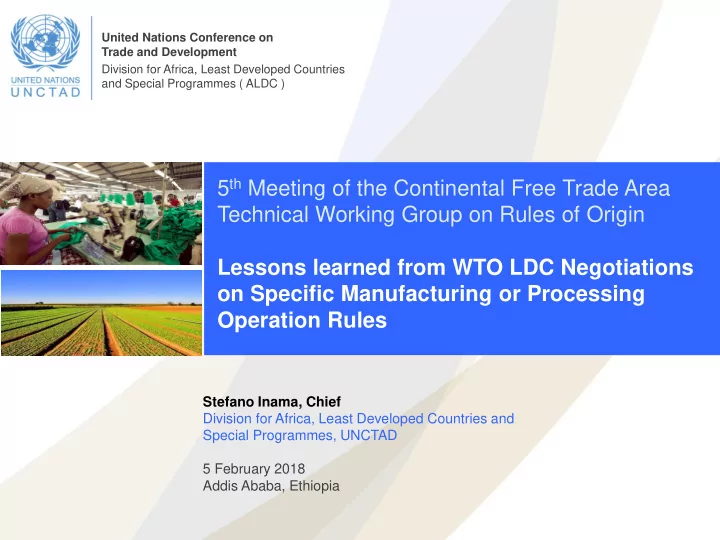

United Nations Conference on Trade and Development Division for Africa, Least Developed Countries and Special Programmes ( ALDC ) 5 th Meeting of the Continental Free Trade Area Technical Working Group on Rules of Origin Lessons learned from WTO LDC Negotiations on Specific Manufacturing or Processing Operation Rules Stefano Inama, Chief Division for Africa, Least Developed Countries and Special Programmes, UNCTAD 5 February 2018 Addis Ababa, Ethiopia
Recalling Paragraph 1.6 of the Bali Decision • In the case of rules that allow a specific manufacturing or processing operation for the purpose of conferring origin, such rules should, as far as possible, take into account the productive capacity in LDCs. • For example, in a number of cases the use of process-based rules for chemical products has made such rules more transparent and easy to comply with. • In addition, for articles of apparel and clothing it may be simpler to demonstrate a substantial transformation using such rules instead of the equivalent change of tariff classification.
Recalling Paragraph 1.3 of the Nairobi Decision “Preference -granting Members shall , to the extent provided for in their respective non-reciprocal preferential trade arrangements , allow as follows: a) if applied to clothing of chapters 61 and 62 of the Harmonized System nomenclature, the rule shall allow assembling of fabrics into finished products; b) if applied to chemical products, the rule shall allow chemical reactions that form a new chemical identity; c) if applied to processed agricultural products, the rule shall allow transforming of raw agricultural products into processed agricultural products; d) if applied to machinery and electronics, the rule shall allow assembling of parts into finished products, provided that the assembly of parts goes beyond simple assembly. ”
Questions • Which WTO members are using specific manufacturing or processing operations to take into account the productive capacities in LDCs ? • Which WTO members are using process-based rules for chemical products ? • Which WTO members are using specific and processing requirements for textile and clothing ? • For which other sectors could specific manufacturing or processing operations be used ?
Point of view of LDCs • There is evidence that in certain sectors a percentage calculation or a CTC is not the best practice to determine substantial transformation • Garments and chemicals are sectors where a rule based on specific working or manufacturing operations seems to be a best practice to have a RoO that is simple and transparent • Can we identify sectors where a specific working or processing operations may be adopted as best practice?
1. Which WTO members are using specific manufacturing or processing operations? (i) Use of Country / specific Sectors where RoO on Comments / additional group of working or working and processing requirements countries processing apply operations European Yes Textile and clothing, Single stage in textile and Union some chemical and clothing HS chapters 61-62 (EBA) metals Japan Yes Textile and clothing Single stage in textile and clothing HS chapters 61-62 Norway Yes Textile and clothing, As above some chemical and metals Switzerland Yes Textile and clothing, As above some chemical and metals
1. Which WTO members are using specific manufacturing or processing operations? (ii) Use of Country / specific Sectors where RoO on Comments / additional group of working or working and processing requirements countries processing apply operations Canada Yes Textile and clothing Cumulation with all beneficiaries makes de facto basis single stage possible United States Yes Apparel Single stage on clothing (AGOA) under the "Special Rule for Apparel" All other preference giving countries are not using specific manufacturing of processing operations
2. Which WTO members are using specific manufacturing and processing requirements for the specific sectors? Country / Chemical reaction Assembly for Fabrics into Raw into Agro- group of for Chemical Machinery and Clothing Processing countries Products Electronics European Yes NO NO NO Union (EBA) United NO NO NO NO States (GSP) United Yes NO NO NO States (AGOA) Japan Yes NO NO NO Canada Yes NO NO NO
Which WTO members are using specific manufacturing and processing requirements for textile and clothing ? • Canada, EU, Japan, US (AGOA) are using a single stage manufacturing and processing requirement for clothing. • One single transformation from fabric to garments should be adopted for clothing of HS chapter 61 and 62 by all preference-giving countries. • A similar rule should be adopted for textile products.
For which other sectors could specific manufacturing or processing operations may be used ? a) For agro-processing products substantial transformation shall be recognized when raw agricultural products are transformed into agro processed products. Ex. Process of canning of raw agricultural products into preserved food preparation. b) For chemical products when a chemical reaction takes place. c) In clothing when fabrics are assembled into finished garments. d) In machinery and electronics when the assembly (not simple assembly) of parts results into a finished products. e) In metals and articles thereof for processes such as coating, heat treatment, etc. Others sectors where a specific manufacturing and processing operations may be simple and transparent ?
Conclusions and Recommendations • Single transformation stage on textile (ex. yarn to fabric) and clothing (ex. fabric to garments) should be used by all preference-giving countries. • The LDC group is ready to submit some examples of best practices where specific working or processing could be used in some specific sectors.
Thank you for your attention Stefano Inama E-mail: stefano.inama@unctad.org United Nations Conference on Trade and Development Division for Africa, Least Developed Countries and Special Programmes ( ALDC ) 12
Recommend
More recommend